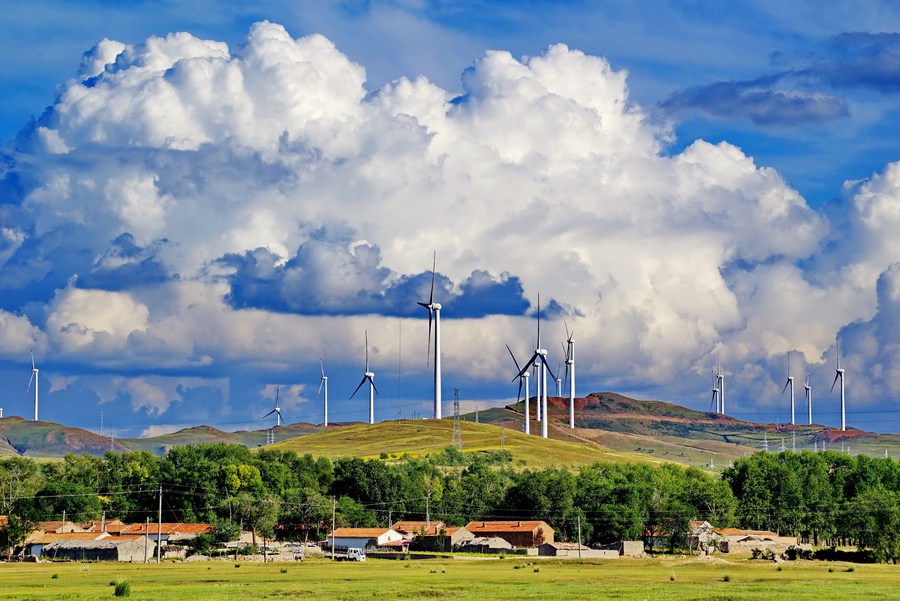Hebei heating shows cool side of climate fight
By Li Wanxin | chinadaily.com.cn | Updated: 2023-01-06 15:47

In North China's Hebei province, gas companies are under increasing pressure for failing to supply abundant gas to local farmers. Reports say that rural households in different cities of Hebei are complaining about restrictions on purchase of natural gas or interruption in gas supply, which is the major source of energy for residents' winter heating and cooking.
It's not the first time that the move to encourage rural households to shift from coal to gas for heating purposes has sparked a heated controversy. And it's quite thought-provoking how the government can strike a good balance between reducing carbon emissions, improving air quality and maintaining people's livelihood.
In fact spillover effects occur when the impact of an event or action affects those not directly involved in creating that event or action. Such an impact could be positive or negative. Spillover effects of climate change could damage the natural and human-built environments and harm people and societies not responsible for emitting huge volumes of carbon dioxide or other harmful gases.
Positive spillover effects are highly desirable for transitioning to eco-friendly, sustainable development. For example, flood-prevention measures and mechanisms prevent property damage and loss of lives, for which long-term planning is needed both within and outside the flood-prone areas. Also, investing in research and development in the green sector can improve sustainability for places where the R&D scientists are based and for other places that have adopted green technologies.
It may be cumbersome for everyone to carry containers from home to buy takeout food. And it may be time-consuming and laborious to help those who lag behind climb a steep learning curve to master low-carbon technologies. After all, besides time and effort, upgrading technologies and infrastructure also requires investment in physical assets that could add up to $275 trillion by 2050 — or $9.2 trillion per year on average — to get to net zero at the global level.
Take for instance the Grain to Green Program. Initiated by the Chinese government in 1999, the program has diversified the sources of income for farmers and created positive spillover effects such as vegetation restoration, flood prevention in the lower reaches of rivers, and increased carbon sequestration at the rate of 15.43 percent a year from 2000 to 2015.
But it is always a difficult choice when it comes to planting cash crops or reclaiming land for development and preserving natural habitats, including marine ones. Closing down coal mines and switching to renewable energy involve planning beyond the energy sector. Due consideration should be given to people's livelihoods and skill training for affected workers, especially because many people are already vulnerable owing to geography, socioeconomic status, livelihood, gender, age, indigenous or minority status, or disability, as well as the ecosystems on which they depend.
Furthermore, the transition to sustainable lifestyles and consumption and production patterns are necessary for addressing climate change. To promote sustainable lifestyles, people should be informed about the positive spillover effects of their energy conservation and water use reduction.
Studies show that people become more environmentally friendly if given the correct information. For example, people can be encouraged to reduce electricity consumption by including additional information in electricity bills, such as the average consumption of similar-sized homes in the neighborhood and methods to reduce energy use.
Daoism and Confucianism are full of moral lessons that can stimulate conservation and prompt people to change their habits, which will have positive spillover effects on society as a whole. Of course, establishing personal carbon accounts, currently under consideration by some localities, could make it easy to quantify and examine the spillover effects of the efforts to encourage people to follow eco-friendly lifestyles.
People measure costs and benefits in the short and long terms, as well as in private and public terms, and local and regional, even global terms. Such tradeoffs determine whether and how much positive spillover effects can be generated or adverse spillover effects reduced or prevented, and how those costs and benefits are distributed in society.
By enabling non-state actors, the government can make those willing to and capable of creating positive spillover effects the agents of change in their respective fields. For instance, the State-owned Assets Supervision and Administration Commission of the State Council of China requested publicly listed companies under the control of the central enterprises to publish their environmental, social, and governance reports starting from January 1, 2023. In the foreseeable future, the good practice will spill over to other enterprises operating in China.
In 2023, in anticipation of extreme weather events such as floods, storms, droughts, heat waves, and wildfires, and chronic risks such as sea level rise, supply chain instability, and rising global food insecurity, the authorities should make more efforts to accelerate capacity building in order to facilitate sustainability transitions.
The author is an associate professor at the School of Energy and Environment & Department of Public and International Affairs, City University of Hong Kong, and a visiting associate professor at the School of Public Policy and Management, Tsinghua University.
The views don't necessarily reflect those of China Daily.
If you have a specific expertise, or would like to share your thought about our stories, then send us your writings at opinion@chinadaily.com.cn, and comment@chinadaily.com.cn.
























